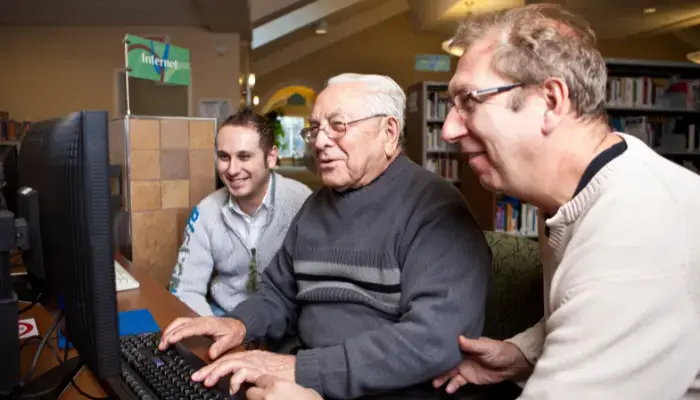According to a recent report from the National Academies of Sciences, Engineering, and Medicine, nearly 25 percent of adults over 65 are considered socially isolated. While it’s possible for anyone to feel lonely even when surrounded by others, helping aging adults make the most of community resources designed for them can help them live more active, more fulfilled, and less lonely lives.
Having a healthy social life is critical to both physical and mental health. Staying engaged and active can even slow the rate of cognitive decline and prevent some health problems in seniors.
If you’re interested in helping an aging adult in your life feel less isolated and more socially active, read on to learn how to promote healthier social habits.
Why Do Some Seniors Become Less Social?
While many older adults continue to have a full social life and appreciate seeing friends and family regularly, others find themselves increasingly isolated. There are a few reasons why they may need help keeping up with their social circle like they once did. These could include:
- Difficulty getting out on their own if they have mobility issues.
- Fewer friends or family members living nearby or able to travel regularly.
- Inability to physically do the things they once enjoyed most.
- Social habits built around daily work life becoming less relevant in retirement.
- Discomfort using technology platforms where much modern socializing occurs.
It isn’t always easy to recognize symptoms of isolation that an older adult may be experiencing, so have a frank discussion with them about your concerns and the importance of socializing regularly. Ask direct questions about daily habits, hobbies, friends they used to see regularly, or how often they leave the house. This may give you the answers you need to help them make positive changes.
Related: Try these 5 strategies for overcoming loneliness in older adults >>
Seniors and Social Media
Social media isn’t just for college students and parents posting baby photos. Approximately 45 percent of adults 65 and older report using social networking sites. When done right, interacting with others online has similar benefits to interacting in person.
Social media can be a simple way for older adults who may have trouble leaving home to stay connected with family and friends who live far away or lead busier lives. Sharing video calls with relatives, sending messages to friends, and seeing photos from acquaintances’ travels help seniors strengthen their social ties.
To help an older adult start using social media, it can be easier to show rather than tell. Help them set up an account on a social media platform that you use regularly and introduce them to some of the basic functions and benefits of engaging with others on the platform. Remember to keep privacy and safety in mind, too. Encourage them to ask you questions or do research before sending money to a stranger or sharing personal information with anyone claiming to be something they’re not.
Benefits of Volunteering for Seniors
Volunteering can promote long-term mental health benefits that go beyond just a good feeling. A study of Senior Corps volunteers who served as tutors for at-risk youth reported feeling healthier, less depressed, and less socially isolated.
Additionally, the seniors felt a sense of accomplishment and appreciated forming meaningful relationships. After two years of service, 84 percent of the older adults in the program reported improved or stable health, and 88 percent reported a decrease in feelings of isolation.
Related: Explore 5 reasons volunteering benefits older adults >>
Volunteering gives seniors a sense of purpose in retirement, which is key to living a fulfilling life.
To help get them started, search for nearby organizations through a local volunteer network, such as New York Cares. Other potential volunteering options include religious organizations, alumni groups, and sites like museums, libraries, animal shelters, and food banks.
Seniors and Continuing Education
If an aging adult has passionately pursued a hobby or hobbies, like someone who has been knitting for years or loves to go birdwatching, it’s natural to want to continue pursuing just those hobbies. For someone who has not developed a hobby over the course of a lifetime, however, or someone who has additional time to dedicate to something new, it’s never too late to begin pursuing a new skill or hobby, which can be the basis for new social opportunities.
Learning something new at any age can help boost brain health and may even slow the progression of mental or physical illness.
One way to encourage older adults to learn a new skill and increase their opportunities to socialize is to help them join a club or take a class that meets regularly. Whether taking music or dance lessons, participating in a writing or art group, or attending any number of active, regularly scheduled community events, new hobbies lead to meeting new people and lessen feelings of isolation.
Local colleges and universities often allow non-students to audit classes for free. You can also check out the offerings at local community hubs like religious and cultural institutions as a way to help a senior find their place in a new social circle. And don’t forget there are plenty of online options for those who are less interested in leaving the comforts of home to socialize!
Senior Living and Active Lifestyles
Senior living communities like 305 West End Assisted Living promote independence through engaging programming and socialization opportunities.
“We offer a daily calendar featuring enrichment programs to meet the needs and interests of all our residents,” said Evan Rossi, Regional Director of Resident Experience for 305 West End Assisted Living. “Residents can choose to attend arts and cultural programming with notable speakers, participate in wellness classes, or join their friends for a Broadway show or an evening out at a new restaurant.”
Our expert team at 305 West End provides assistance to residents so they can fully embrace luxurious, carefree living in the heart of Manhattan.
More Caregiver Resources
If you enjoyed this article, dive into one of our other great reads. Discover natural ways to boost your energy as a caregiver, or check out these time management tips.
This blog was originally published in 2019. It was updated in August 2024.







